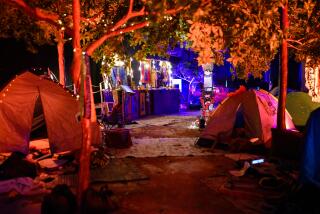Moscow Yields, Permits Jewish Film Festival
- Share via
MOSCOW — Under pressure from top Soviet government and Communist Party officials, Moscow city authorities agreed Wednesday to permit a weeklong international Jewish film festival despite their earlier fears that the festival might bring anti-Semitic demonstrations.
Reversing their previous decision, the city authorities said that “the political situation in the city . . . was less complicated” and that security could be provided for those attending the festival, scheduled to begin Saturday.
“Cancellation of a festival of Jewish films because reactionary anti-Semites might protest against it amounted to the surrender of the Soviet Union’s capital city to the worst sort of element,” Rustam Ibragimbekov, president of the American-Soviet Film Initiative, one of the festival’s sponsors, said he had argued in a telegram to Moscow Mayor Valery T. Saikin.
“And to say that we cannot have a Jewish film festival during elections, which are now largely over, because passions might be aroused makes us all anti-Semites, and that we must also reject.”
The weeklong festival is expected to attract more than 50,000 people, making it the largest Jewish cultural event in Soviet history. The 29 films deal with a variety of Jewish themes.
“Soviet Jews need to know what Jewish life is outside the Soviet Union,” Deborah Kaufman, the American director of the festival, said. “We give them broad-brush pictures and ‘snapshots,’ feature films and documentaries. . . . We were devastated when it looked like the festival was going to collapse just days before it was scheduled to open.”
Many Soviet officials had intervened this week with forceful arguments on holding the festival before Saikin relented, according to Soviet sources. Still, the battle was not easily won, they said, because of strong opposition within the bureaucracy.
Andrei S. Smirnov, secretary of the influential Soviet Union of Cinematographers, had declared that the city’s decision denying the festival the theaters it needed amounted to political censorship. Another union official said that the festival would prove to be “an antidote to anti-Semitism” should it proceed.
The Soviet Foreign Ministry warned city authorities that the image of the country as increasingly progressive and politically open under President Mikhail S. Gorbachev would be seriously impaired by the festival’s postponement or cancellation.
Also, such a step could adversely affect all future cultural exchanges with the United States and other Western countries, the ministry reportedly told the city, after strong U.S. Embassy protests over the threatened cancellation or postponement.
Leading members of the Supreme Soviet, the national legislature, including Fyodor M. Burlatsky, Sergei B. Stankevich and Arkaby Murashev, met with the festival organizers and later pressed their case with government and party officials.
And the ideological department of the party’s policy-making Central Committee told Moscow city officials that they had gotten their priorities wrong--that their activities, including the latest decision, were undercutting domestic policies and damaging the country’s foreign interests.
“Whatever the circumstances, the appearance of tolerating and accommodating anti-Semitism destroys whatever sympathy we have earned generally for Soviet policies,” a senior party official commented.
“Sometimes, however, one of our officials has trouble understanding and asks, ‘What is so special about a Jew?’ That is sort of what has been happening with this festival.”
But Vladimir V. Ploshansky, director of the firm that runs Moscow’s movie theaters, who earlier in the week complained that he would lose money for every day of the screenings, commented Wednesday: “We are only too pleased to be able to do this, and I don’t think I want to say more than that.”
Kaufman, of the San Francisco Jewish Film Festival, called the reversal “quite dramatic--we have gone from despair to full satisfaction, and that in 24 hours.”
“Take the security issue, for example,” she continued. “Only on Tuesday, we were being told that the festival could not be held because security would be difficult; a day later, the police told us there would be no security problems that they could not handle.”
The festival now has commitments for use of the prestigious theater at the Rossiya Hotel off Red Square for the opening and closing ceremonies and for the rental of three movie houses in central Moscow to show the 29 films through the week.
Meanwhile, five ultra-rightist Soviet groups, often seen at the heart of present-day anti-Semitism as well as Russian nationalism, announced Wednesday that they have joined forces to promote a czarist monarchy to save Russia.
“Seeing that our country is now in a very dangerous situation, we decided to form the Russian Orthodox popular sentiments into a fist to smash in the teeth of the scum who want to see Russia destroyed,” Evgeny Pashkin, an activist who helped bring the groups together, said, referring to liberals “and especially Jews.”
“Russia’s salvation lies with God and patriotism.”
Much of the groups’ program spoke darkly about threats from Jews or Zionists and of conspiracies by them to take over the country, though they number only about 2 million people in a country of more than 287 million.
More to Read
Sign up for Essential California
The most important California stories and recommendations in your inbox every morning.
You may occasionally receive promotional content from the Los Angeles Times.













